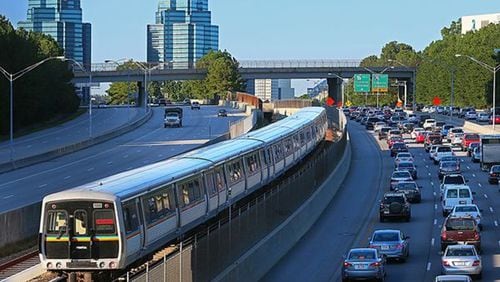With metro Atlanta on the verge of a major transit expansion, a new agency will try to build a seamless public transportation system across the region.
State lawmakers have given the Atlanta-Region Transit Link Authority – "the ATL" for short – major powers over transit funding and planning in 13 metro counties. It will draft a regional transit plan, funnel billions of dollars to favored projects and bump others down the list of regional priorities.
VIDEO: More on transit expansion
Critics say the agency’s board – which held its first meeting Friday – is heavy with elected officials who may care more about their local interests than what’s best for the region.
“They need to have transit experts on the board, not politicians,” said Sherry Williams, public policy coordinator for Georgia STAND-UP, a community group concerned with poverty and civil rights issues.
ATL officials say board members have a mix of transportation, business and political expertise that will serve the region well. They say their primary job is to create a transit system that works for passengers across metro Atlanta.
“The goal here is, how do we make our existing transit systems part of a more connected network, and how are we going to bring that vision to the users of the system?” said Chris Tomlinson, the agency’s interim executive director.
No one disputes there’s plenty of room to improve transit service across metro Atlanta.
The region’s biggest transit agency – MARTA – serves only three of the 13 metro counties. Gwinnett, Cobb and other counties provide their own transit services. The state also has a commuter bus service.
Though these agencies coordinate their efforts, regional coordination only goes so far. One example: Each agency has its own transit app, making it hard for customers to plan a trip, let alone travel from one county to another by bus in an efficient manner.
“You’d be hard pressed to go online and find a single map that shows all the transit service available in metro Atlanta,” Tomlinson told the State Transportation Board Wednesday. “All of them are separated.”
Spurred to action by some of the world's worst traffic and by economic development imperatives, state lawmakers this year approved legislation that could pave the way for a major transit expansion across metro Atlanta.
House Bill 930 allows local governments to raise sales taxes for transit construction and operations – Gwinnett County will be first, with a MARTA referendum in March. The bill also created the ATL Board to oversee regional transit planning and funding.
Five of the board's 16 members are appointed by state officials, and 10 are elected by district by state legislators and local elected officials (the commissioner of the Georgia Department of Transportation also serves as a non-voting member). With those elections over, the board is ready to go to work.
First up: creating an “ATL” logo that will adorn trains and buses across the region in years to come. The brand may supplement – rather than replace – MARTA and other existing agency logos. But Tomlinson said a common brand will help create a uniform transit experience for customers, even as MARTA and other agencies continue to operate their respective services.
The ATL Board also must approve local transit plans to ensure they form a seamless system. And it will determine which projects get first shot at crucial state and federal funding.
Lawrenceville City Manager Chuck Warbington, an ATL Board member, said he doesn’t anticipate many changes to local plans.
Warbington said many projects won’t come up for funding at the same time, lessening the competition. And he said the board should adopt data-driven criteria for making funding decisions when competition for limited money does arise.
Still, some worry those decisions will be based on who has the most political clout, rather than what’s best for the region. Four of the board’s 16 members are elected officials, including Atlanta Mayor Keisha Lance Bottoms, Gwinnett County Chairwoman Charlotte Nash and DeKalb County CEO Michael Thurmond.
“If the ATL Board had more experts, I think that how the system progresses over time will be less political,” said Georgia STAND-UP’s Williams.
That’s not the only concern. DeKalb government watchdog Ed Williams wonders whether elected officials will have the time to devote to their ATL duties. He also believes politicians shouldn’t serve on the board.
Nash, appointed by House Speaker David Ralston, said she’s “very clear” she’s representing the entire region, not just Gwinnett, on the board.
“I think the composition of the board is going to create enough balance to offset any kind of provincialism, in terms of looking out for your own jurisdiction,” Nash said.
There are some transportation experts on the board. Steve Dickerson is a retired Georgia Tech professor who has organized community vanpools and patented early ride-haling technology. He said one of his top priorities on the board will be creating a single app that customers can use, regardless of which agency operates the bus or train they’re riding.
Dickerson said he’s fine with the composition of the board. He said its members will bring different strengths. And he said it can tap the agency’s staff for technical expertise.
At Friday’s meeting, state Sen. Brandon Beach and Rep. Kevin Tanner - who sheparded the ATL legislation through the General Assembly - expressed confidence the ATL will serve the region well.
“If this board looks at every decision to make through the customer point of view, I think we can really do some great things for this region,” Beach told board members. “Let’s do what’s best for the customer. Let’s do what’s best for the region.”
But for now, the agency's greatest accomplishment may be symbolic. Its very existence signals a dramatic shift in priorities for a region that has long resisted transit expansion. And it could serve as a vehicle for an infusion of state funding.
“For the first time, the state is going to have a board, an organization, that has a singular focus on transit,” Tomlinson told the State Transportation Board this week. “This is truly a first for Georgia.”
Staff writer Tyler Estep contributed to this report
A new regional transit board
The Atlanta-Region Transit Link Authority (ATL) will oversee transit planning and funding in 13 metro counties: Cherokee, Clayton, Coweta, Cobb, DeKalb, Douglas, Fayette, Forsyth, Fulton, Gwinnett, Henry, Paulding and Rockdale.








